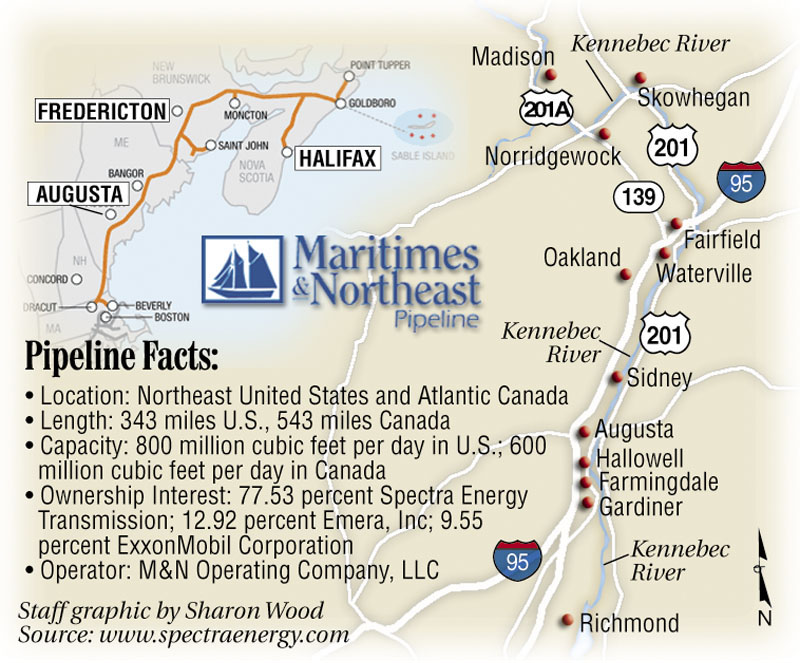A tentative framework on tax breaks to help finance a $70 to $80 million natural gas pipeline through the heart of central Maine is now in place, according to local officials and the company behind the project.
Even so, the Portland-based Kennebec Valley Gas Company has yet to secure large commercial customers for its natural gas, the crucial step in its effort to build the 56-mile pipeline from Richmond to Madison.
“Until the company has a deal with its anchor tenants, it’s all just a conversation about what might happen,” said Ken Young, executive director of the Kennebec Valley Council of Governments. “Nobody’s going to pull the trigger (on tax breaks) until there’s a deal that the gas company has users.”
The gas company has presented its proposal to local municipal officials, who are being represented by the council of governments.
Richard Silkman, a principal of the new gas company and a former state planning official under Gov. Angus King, said commitments with potential commercial users should be secured by the end of this year.
He said some have given “conditional sign-ups,” but most are conducting studies to calculate possible cost-savings of switching to natural gas against how much it would cost to retrofit their facilities, Silkman said.
Silkman thinks such studies will reveal the benefits of natural gas. Under current market conditions, using natural gas would cost about half as much as fuel oil, he said. According to a presentation he gave to KVCOG members, oil has recently been priced at $24 to $25 per 1 million British thermal units, whereas natural gas prices have been closer to $5 per 1 million BTUs.
“We continue to talk to the largest of the (potential) users,” Silkman said. “There’s a lot of enthusiasm about natural gas, but we haven’t gotten any formal commitments yet from them. But we’re still very optimistic.”
Initially, the project would involve a high-pressure main pipeline, which could serve large users such as Huhtamaki Packaging in Waterville, Sappi Paper in Skowhegan and Madison Paper, while lower-pressure local loops would serve other commercial and residential areas.
Silkman has told KVCOG members that other potential users include the Gardiner downtown business district and industrial park, the State House complex, the proposed new MaineGeneral Medical Center in North Augusta, Kennedy Memorial Drive and downtown Waterville, among other places.
Construction could start and end in the 2013 season; all sections of the pipeline could be built simultaneously, Silkman has said.
More approvals needed
Under the terms of the proposed deal for Kennebec Valley Gas Company, tax-increment financing, or TIFs, would “shelter” the value of the pipeline in each community, funneling its property tax revenue back to the company to help finance the project.
The TIFs would last for 15 years, according to the draft agreement. The first 10 years, the company would get all of the tax revenue and the last five the revenue balance would decline, Young said. Gas company officials had initially proposed a 20-year agreement with 100 percent of the revenue.
“The proposal on the table is less generous than that; it would return less to the company,” Young said.
Silkman, too, concedes the draft agreement isn’t all the company hoped for.
“It is a compromise that provides us with what we need to go forward,” he said. “I think it is a good arrangement. It’s going to be financially challenging to get this deal done even with what we asked for originally, but I think we can do it with what we got.”
Representatives from the 12 communities selected a smaller group to serve as a negotiating committee, which met with gas company representatives June 27, when they reached this agreement.
The negotiating committee now plans to meet with a larger group of local officials this month “so that everybody’s essentially on the same page and to see if it’s possible to reach an agreement with the gas company,” Young said.
Then, each of the 12 communities would need to individually decide whether to approve the TIF agreement for the pipeline project, either at town meetings or by votes of their town or city councils, or board of selectmen.
The gas company also needs approvals from the Public Utilities Commission, Department of Environmental Protection and Department of Transportation. It has filed a certificate with the PUC, Silkman said, and is asking for conditional approval by the end of the summer.
Young said there’s still a long road ahead before the pipeline becomes a reality.
“It’s going to be a cumbersome process and it’s difficult to predict the outcome,” Young said. “But it’s my sense that people see the availability of an alternative energy source, and one with potentially significant cost advantages over oil, as providing an economic advantage to the region that it doesn’t have right now. It’s an attractive option.”
Scott Monroe — 861-9239
smonroe@centralmaine.com
Send questions/comments to the editors.



Success. Please wait for the page to reload. If the page does not reload within 5 seconds, please refresh the page.
Enter your email and password to access comments.
Hi, to comment on stories you must . This profile is in addition to your subscription and website login.
Already have a commenting profile? .
Invalid username/password.
Please check your email to confirm and complete your registration.
Only subscribers are eligible to post comments. Please subscribe or login first for digital access. Here’s why.
Use the form below to reset your password. When you've submitted your account email, we will send an email with a reset code.